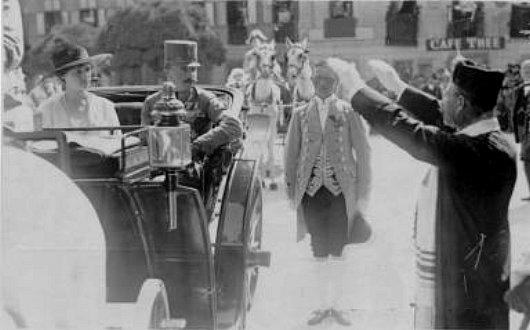London, GB | Formerly of New York, Buenos Aires, Fife, and the Western Cape. | Saoránach d’Éirinn.

About Andrew Cusack
 Writer, web designer, etc.; born in New York; educated in Argentina, Scotland, and South Africa; now based in London.
Writer, web designer, etc.; born in New York; educated in Argentina, Scotland, and South Africa; now based in London. read more
News
Blogs
Reviews & Periodicals
Arts & Design
World
France
Mitteleuropa
Knickerbockers
Argentina
The Levant
Africa
Cape of Good Hope
Netherlands
Scandinavia
Québec
India
Muscovy
Germany
Academica
Hapsburg Hebraica

Empress Zita and Emperor Charles of Austria are prayed over by a Jewish rabbi.
After the passing of the Hapsburg empire, which had been so protective of its Jewish subjects (especially compared to the regimes which succeeded it), numerous prominent Jews were received into the Catholic faith, perhaps having come to a full appreciation of precisely what they had lost. The subject of “Literary Jewish Converts to Christianity in Interwar Hungary” is worthy of further investigation (some graduate student should write a dissertation on just such a matter). I am no longer surprised when, in my researches, I come across yet another fascinating Hungarian Jew — be he a writer, playwright, poet, or patron — and discover, usually buried in some footnote, that he died a good Catholic.
Published at 10:02 pm on Wednesday 30 December 2009. Categories: Austria Bohemia Church Hapsburg History Hungary Monarchy Saints Tags: Austria, Charles of Austria, Hapsburg, History, Judaism, Monarchy.
Search
Instagram: @andcusack
Click here for my Instagram photos.Most Recent Posts
- Articles of Note: 11 November 2024 November 11, 2024
- Why do you read? November 5, 2024
- India November 4, 2024
- The Lithe Efficiency of the Old Constitution November 4, 2024
- Waarburg October 2, 2024
Most Recent Comments
Book Wishlist
Monthly Archives
Categories
Home | About | Contact | Paginated Index | Twitter | Facebook | RSS/Atom Feed
andrewcusack.com | © Andrew Cusack 2004-present (Unless otherwise stated)



“some graduate student should write a dissertation on just such a matter”
Perhaps Mr. Cusack might heed his own suggestion? Speaking of Hungarian Jews, perhaps George Soros could fund your study through his Central European University. You never know!
Anyone interested in “the subject of ‘Literary Jewish Converts to Christianity in Interwar Hungary’…” might contact the Department of Jewish-Christian Studies at Seton Hall University. Also consult “Walls are Crumbling; Seven Jewish Philosophers Discover Christ” by John M. Oesterreicher, The Devin-Adair Company, New York, 1952.
Prime example: the unjustly forgotten Aurel Kolnai.
The “Grand Title” of the Emperor of Austria contained a great many heirlooms, results of several centuries of dynastic entanglements. One of these heirlooms was the title of “King of Jerusalem”. There is an oral tradition (you could also call it an anecdote) that at some time (c. 1960), several Orthodox Jews came to the Austrian Embassy in Israel and asked when Emperor Otto would be crowned; and, incidentally, as being King of Jerusalem, could he please enact a ban on secular European Jews coming to Israel? The officials at the embassy were rather embarassed about the whole thing, Austria now being a Republic and Herr Habsburg-Lothringen being persona non grata with a very major political party and all that … Se non è vero, è ben trovato.
BTW if somebody is interested the blessing that is shown in the picture is called “Tefilah leShlom HaMalchut” (=Blessing for the Peace [or well-being] of the Monarchy) and is said in Public for the Monarch and the royal (or in this case imperial) family.
An example from the UK can be seen here: http://upload.wikimedia.org/wikipedia/commons/2/26/Prayer_for_the_Royal_Family_1860.jpg
In line with the topic the former Mayor of New York Edward Koch has said more than once that his immigrant Jewish parents who hailed from Habsburg Galicia always referred to the Emperor Franz Joseph as “der gute alte Kaiser” ( interestingly in German.)